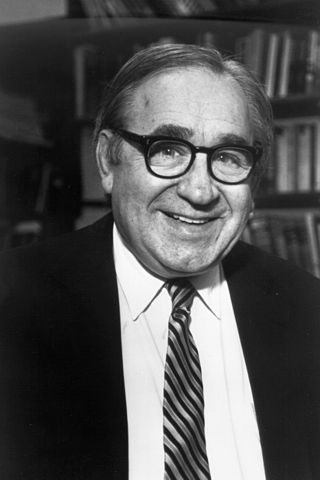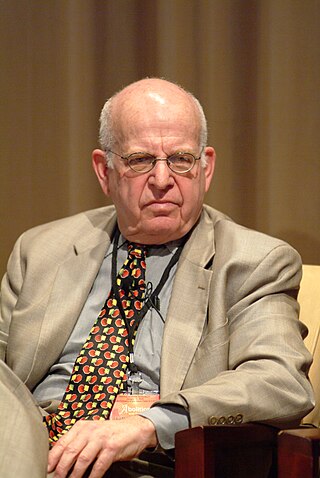Related Research Articles

Wage slavery is a term used to criticize exploitation of labor by business, by keeping wages low or stagnant in order to maximize profits. The situation of wage slavery can be loosely defined as a person's dependence on wages for their livelihood, especially when wages are low, treatment and conditions are poor, and there are few chances of upward mobility.

Robert William Fogel was an American economic historian and scientist, and winner of the 1993 Nobel Memorial Prize in Economic Sciences. As of his death, he was the Charles R. Walgreen Distinguished Service Professor of American Institutions and director of the Center for Population Economics (CPE) at the University of Chicago's Booth School of Business. He is best known as an advocate of new economic history (cliometrics) – the use of quantitative methods in history.
Edmund Sears Morgan was an American historian and an authority on early American history. He was the Sterling Professor of History at Yale University, where he taught from 1955 to 1986. He specialized in American colonial history, with some attention to English history. Thomas S. Kidd says he was noted for his incisive writing style, "simply one of the best academic prose stylists America has ever produced." He covered many topics, including Puritanism, political ideas, the American Revolution, slavery, historiography, family life, and numerous notables such as Benjamin Franklin.
Stanley Lewis Engerman was an American economist and economic historian. He was known for his quantitative historical work along with Nobel Prize-winning economist Robert Fogel. His first major book, co-authored with Robert Fogel in 1974, was Time on the Cross: The Economics of American Negro Slavery. This significant work, winner of the Bancroft Prize in American history, challenged readers to think critically about the economics of slavery. Engerman has also published over 100 articles and has authored, co-authored or edited 16 book-length studies.
Ulrich Bonnell Phillips was an American historian who largely defined the field of the social and economic studies of the history of the Antebellum South and slavery in the U.S. Phillips concentrated on the large plantations that dominated the Southern economy, and he did not investigate the numerous small farmers who held few slaves. He concluded that plantation slavery produced great wealth, but was a dead end, economically, that left the South bypassed by the industrial revolution underway in the North.

Francis Butler Simkins was a historian and president of the Southern Historical Association. He is best known for his highly praised history of the Reconstruction Era in South Carolina, that gave fair coverage to all sides, and for his widely used textbook The South, Old and New (1947) and his monographs on South Carolina history. He was a professor at Longwood College in Virginia, Simkins was a leading progressive in the 1920s and 1930s regarding race relations but became a defender of segregation in the 1950s and 1960s.

Ira Berlin was an American historian, professor of history at the University of Maryland, and former president of Organization of American Historians.

Claudia Dale Goldin is an American economic historian and labor economist. She is the Henry Lee Professor of Economics at Harvard University. In October 2023, she was awarded the Nobel Memorial Prize in Economic Sciences "for having advanced our understanding of women's labor market outcomes”. The third woman to win the award, she was the first woman to win the award solo.

Slavery in Britain existed before the Roman occupation and until the 11th century, when the Norman conquest of England resulted in the gradual merger of the pre-conquest institution of slavery into serfdom, and all slaves were no longer recognised separately in English law or custom. By the middle of the 12th century, the institution of slavery as it had existed prior to the Norman conquest had fully disappeared, but other forms of unfree servitude continued for some centuries.
Vincent Brown is Charles Warren Professor of History, Professor of African and African-American Studies, and Director of the History Design Studio at Harvard University. His research, writing, teaching, and other creative endeavors are focused on the political dimensions of cultural practice in the African Diaspora, with a particular emphasis on the early modern Atlantic world.

Walter Johnson is an American historian, and a professor of History and of African and African-American Studies at Harvard University, where he has also directed the Charles Warren Center for Studies in American History.
Alan Gallay is an American historian. He specializes in the Atlantic World and Early American history, including issues of slavery. He won the Bancroft Prize in 2003 for his The Indian Slave Trade: the Rise of the English Empire in the American South, 1670-1717.
Rebecca Jarvis Scott is an American historian, and Charles Gibson Distinguished University Professor of History and Professor of Law, at University of Michigan.
Manisha Sinha is an Indian-born American historian, and the Draper Chair in American History at the University of Connecticut. She is the author of The Slave's Cause: A History of Abolition (2016), which won the Frederick Douglass Book Prize.

Lisa DeNell Cook is an American economist who has served as a member of the Federal Reserve Board of Governors since May 23, 2022. She is the first African American woman and first woman of color to sit on the Board. Before her appointment to the Federal Reserve, she was elected to the board of directors of the Federal Reserve Bank of Chicago.
Jane F. Gardner was a British Roman historian, academic, and museum curator. She was emerita professor of Roman History at University of Reading, specialising in Roman law and Roman social history. She was a professor at the university from 1993 until her retirement in 1999, having taught there since 1963. She was curator of the Ure Museum of Greek Archaeology from 1976 to 1992.
Stephanie E. Jones-Rogers is an American historian. She is an associate professor of history at the University of California, Berkeley, and the author of They Were Her Property: White Women as Slave Owners in the American South. She is an expert in African-American history, the history of American slavery, and women's and gender history.
Narrative of Henry Watson, a fugitive slave is a slave narrative by Henry Watson, an African-American slave and abolitionist. His work is autobiographical, characteristic of the slave narratives of fugitive slaves of the period before emancipation. It is written in a "polemical" style typical of fugitive slave narratives and details the abuses he experienced while enslaved. Unlike most fugitive slave narratives, however, Watson's memoir recounts his self-doubt rather than projecting an image of heroism.
Ellora Derenoncourt is an American economist. She is an assistant professor of Economics in the Industrial Relations Section of the Department of Economics at Princeton University and a member of the Industrial Relations Section of Princeton Economics. She was previously at the Department of Economics and assistant professor of Public Policy at the Goldman School of Public Policy at UC Berkeley. Her work focuses on labor economics, economic history and the study of inequality. Her research on racial inequality in the United States has been featured on NPR, New York Times, and The Wall Street Journal.
Martin A. Klein is an Africanist and an emeritus professor in the History Department at the University of Toronto specialising in the Atlantic slave trade, and francophone West Africa: Senegal, Guinea, and Mali. He obtained a Bachelor of Arts degree in journalism at Northwestern University (1951-1955) and a Master of Arts and Doctor of Philosophy in history at the University of Chicago (1957-1964). Klein worked as an assistant professor at the University of California Berkeley from 1965 till 1970, later teaching African history at the University of Toronto as an associate professor and later full professor from 1970 until his retirement in 1999. As a Fulbright Fellow, Klein taught for a year at Lovanium University in Kinshasa.
References
- ↑ "Francis B. Simkins Award". Southern Historical Association. Retrieved 2023-02-08.
- ↑ "First Monograph Prize in Economic and/or Social History". Economic History Society. Retrieved 2023-02-08.
- 1 2 "Accounting for Slavery". Harvard University Press. Retrieved 2023-01-07.
- ↑ Walsh, Lorena S. (October 2019). "Caithlin Rosenthal. Accounting for Slavery: Masters and Management". The American Historical Review. 124 (4): 1404–1406.
- ↑ Hyman, Louis (2019). "Book Review: Accounting for Slavery: Masters and Management. By Caitlin Rosenthal". ILR Review. 73 (1). doi:10.1177/0019793919880856.
- ↑ Stapleton, Darwin (January 2020). "Accounting for Slavery: Masters and Management by Caitlin Rosenthal (review)". Technology and Culture. 6 (1): 346–347. doi:10.1353/tech.2020.0026.
- ↑ Roberts, Justin (2020). "Accounting for slavery: masters and management, by Caitlin Rosenthal". Slavery & Abolition: A Journal of Slave and Post-Slave Studies. 41 (3). doi:10.1080/0144039X.2020.1790769.
- ↑ Davidson, Ben (December 2020). "Accounting for Slavery: Masters and Management by Caitlin Rosenthal (review)". Civil War History. 66 (4): 416–417.
- ↑ Sklansky, Jeffrey (Spring 2021). "Accounting for Slavery: Masters and Management. By Caitlin Rosenthal". Journal of Social History. 54 (3): 973–975. doi:10.1093/jsh/shz115.